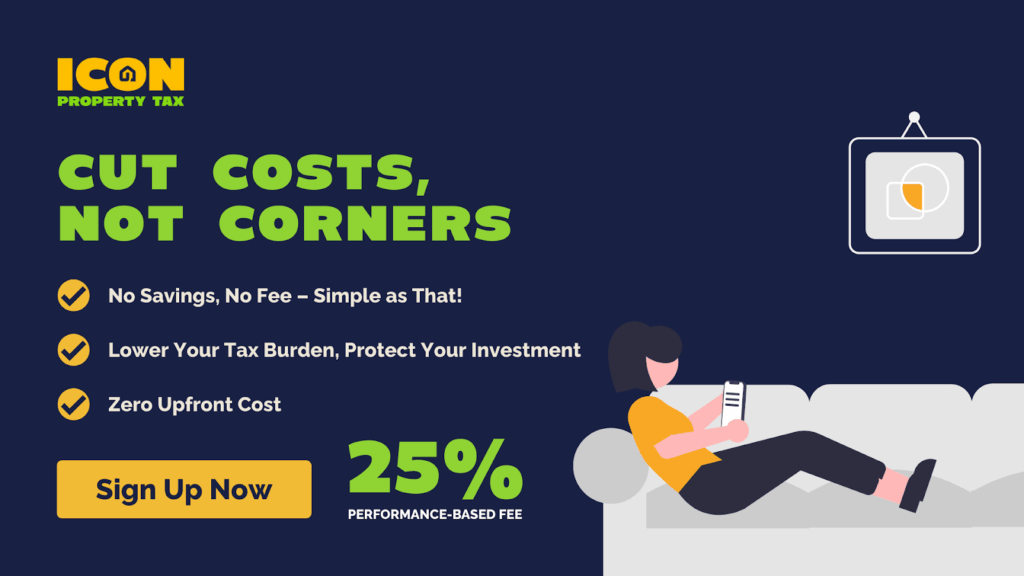Personal Property Tax Vs Real Estate Tax: What You Need To Know
November 2, 2025
Key Takeaways:
- Tax Distinctions: Real estate and personal property taxes differ based on permanence, ownership, and use, each requiring unique assessment methods.
- Reporting Rules: Real estate is automatically assessed, while business owners must file annual renditions for personal property.
- Appeal Opportunities: Property owners can appeal inaccurate valuations to correct over assessments and achieve fair tax treatment.
Property taxes can be complex, especially when understanding how real estate and personal property are taxed differently. Both affect what you owe each year, but they are governed by separate rules, valuation methods, and reporting requirements. Knowing these differences helps property owners stay informed, avoid overpayment, and take control of their tax responsibilities with confidence.
At Icon Property Tax, we take pride in being one of the most trusted names in property tax appeal services. With over 30 years of combined experience, zero upfront fees, and a performance-based fee structure, our local tax agents have helped clients achieve more than $100 million in savings through accurate valuations and effective appeals. We are committed to providing transparency, fairness, and data-driven insights that protect our clients from inflated property tax assessments.
What Is Real Estate Tax?
Real estate tax is a recurring levy imposed by local governments on land and permanent structures such as homes, commercial buildings, and other improvements. It funds vital public services, including schools, infrastructure, and emergency response. Each year, appraisal districts determine a property’s market value by reviewing comparable sales and characteristics like square footage, age, and condition. Local taxing entities then apply their rates to calculate the total amount owed. Since market values can shift over time, staying informed about your assessment is essential to avoid overpayment. Icon Property Tax offers a convenient way to review your property insights and understand how local data impacts your valuation, helping you identify appeal opportunities and secure fair, accurate property taxes.

What Does Real Estate Tax Apply To?
Understanding what qualifies as taxable real estate is crucial for homeowners and investors. Real estate tax applies to property that is permanently attached to the land, and knowing which assets fall under this category helps you stay compliant and avoid unnecessary costs:
Residential And Commercial Properties
Real estate tax applies to both residential and commercial properties, including single-family homes, condominiums, office buildings, and retail spaces. Whether the property is owner-occupied or rented out, it is assessed based on its market value and condition. Since these structures are considered permanent fixtures, they fall under the scope of real property taxation. Icon Property Tax helps property owners evaluate these assessments and identify opportunities to appeal if the valuation appears overstated.
Land And Improvements
Vacant land, agricultural parcels, and lots with improvements such as fencing, driveways, or barns are also subject to real estate tax. These features increase a property’s market value because they enhance the land’s usability or overall appeal. Assessors take these elements into account when calculating your property’s taxable value, which can significantly influence your annual tax bill.
Special Cases Like Mobile Homes
Mobile homes present a unique case because their tax classification depends on how they are installed. If a mobile home is permanently affixed to the ground and titled as part of the land, it is considered real property. However, if it remains movable or registered separately, it is treated as personal property. To see how your property or structure is categorized, you can look up your property through Icon’s platform and gain clarity before your next assessment.
How Real Estate Tax Is Calculated
Real estate tax is determined through a step-by-step process that starts with assessing your property’s market value and ends with applying local tax rates. Understanding how each stage works helps property owners see where valuation errors can occur and how they can appeal for a fair adjustment:
Appraised Value
Local appraisal districts evaluate properties annually to determine their fair market value. This process involves analyzing recent sales of comparable properties, known as “comps,” and adjusting for differences such as size, age, location, and condition. The resulting figure represents what your property would likely sell for in the open market. Staying aware of how this value is determined helps you recognize when your assessment might not accurately reflect real conditions.
Assessed Value
In many cases, the assessed value is the same as the appraised value unless exemptions or caps apply. For instance, homeowners with a homestead exemption may have limits on how much their taxable value can increase each year. Understanding these rules helps property owners identify when to appeal and which factors can influence their final tax amount.
Tax Rate Application
Once the assessed value is finalized, local taxing entities such as cities, counties, and school districts apply their tax rates. These rates are typically expressed per $100 of assessed value and can vary by location. Multiple entities contribute to the overall tax burden, which is why two properties of similar value might have different total tax bills.
The Calculation Formula
The basic formula for calculating property tax is: Real Estate Tax = (Assessed Value ÷ 100) × Total Tax Rate. This simple equation determines how much you owe based on your property’s value and local rates. However, overvaluations can lead to inflated tax bills. Icon Property Tax specializes in identifying such discrepancies and helping property owners appeal inaccurate assessments. You can review your property insights anytime to see how your valuation compares within your area and take action if adjustments are needed.
Who Pays Real Estate Tax And When?
Real estate taxes are the responsibility of the property owner listed as of January 1 of the tax year. Understanding who is liable and when payments are due helps homeowners avoid penalties, interest charges, and legal complications that may result from missed deadlines.
Property owners are responsible for paying their real estate tax, even if they sell the property later in the year. Although buyers and sellers often agree to split or prorate taxes at closing, the taxing authority still holds the owner on record accountable until the payment is settled. Most counties send appraisal notices in the spring to inform owners of their property’s new value, giving them an opportunity to appeal if they believe the assessment is too high. Tax bills are typically mailed out in October, and payments are due by January 31 of the following year. Missing this deadline can lead to penalties and accumulating interest.
For those with mortgages, lenders usually collect a portion of property taxes each month through escrow accounts and make the payment on behalf of the homeowner. However, it is still the owner’s responsibility to confirm that payments are accurate and on time. If you’ve received a new appraisal notice and suspect your valuation is higher than it should be, Icon Property Tax can help you review your assessment and explore your appeal options. You can also look up your property to track your valuation history and understand how your taxes are calculated before the next billing cycle.
What Is Personal Property Tax?
Personal property tax applies to tangible, movable assets that are not permanently attached to land or buildings, such as machinery, tools, equipment, and business inventory. Unlike real estate tax, which focuses on immovable property, personal property tax is based on ownership and use, typically applying to business assets that generate income. Each year, business owners must file a Business Personal Property Rendition that lists asset details like purchase price and acquisition year, which the appraisal district uses to determine taxable value. At Icon Property Tax, we help business owners navigate this process, identify overvalued assets, and confirm whether their assessments reflect true market conditions. If you believe your property taxes are too high, you can look up your property to view accurate insights and explore your appeal options with no upfront costs.

What Does Personal Property Tax Apply To?
Personal property tax applies to tangible, movable assets used for business or income-generating purposes, such as office furniture, machinery, business vehicles, and inventory. These assets are taxable when they contribute to a company’s operations, while household goods and personal items are typically exempt. Even leased assets may be taxed if they are used for business activities, with reporting responsibility often falling on the user. Failure to declare these assets can lead to inflated assessments or fines. Icon Property Tax helps business owners review their property listings to confirm accurate asset classification and avoid costly errors. For a clearer view of your business property valuation, you can look up your property and gain reliable, data-backed insights into your potential appeal opportunities.
How Personal Property Tax Is Calculated
Calculating personal property tax involves several steps that rely on accurate self-reporting, valuation, and local tax rate application. Understanding each stage helps business owners stay compliant and avoid penalties caused by missing details or incorrect data:
Filing The Annual Rendition
Every year, businesses must submit a Business Personal Property Rendition to their county appraisal district. This report lists all taxable assets owned or used as of January 1, including descriptions, purchase prices, and acquisition years. The accuracy of this report directly affects the outcome of your assessment, making it essential to keep detailed records of business property and equipment. Icon Property Tax assists businesses in reviewing their renditions to help prevent costly reporting errors.
Valuation And Depreciation
After receiving the rendition, the appraisal district determines the current market value of each asset. Depreciation schedules are applied to reflect how much value an item has lost over time due to age and use. While these schedules are standardized, they may not always represent the true market resale value, leading to potential overvaluation. This is where Icon’s team can analyze data and identify whether your reported values align with realistic market conditions.
Application Of Local Tax Rates
Once a total taxable value is established, local taxing entities apply their rates to calculate the final amount owed. These rates vary depending on the jurisdiction, meaning businesses in different counties may pay different amounts on assets of similar value. Missing the filing deadline can result in estimated values and penalties of up to 10 percent. To stay ahead of these deadlines, you can look up your property through Icon’s portal and access personalized insights about your valuation, deadlines, and potential appeal options.
Who Pays Personal Property Tax And When?
Personal property tax is generally the responsibility of the business owner who owns or uses taxable assets as of January 1 of the tax year. Knowing who must pay and when payments are due helps business owners stay organized and avoid late penalties or compliance issues.
In most cases, businesses are responsible for paying taxes on all assets used for income-generating purposes, regardless of ownership status. This means even leased equipment or shared assets can be taxable if they are in the business’s possession on January 1. Once the annual Business Personal Property Rendition is filed, the appraisal district processes the report and later sends tax bills, typically in October. Payments are due by January 31 of the following year, with penalties and interest applied to late submissions.
Failing to file or pay on time can lead to inflated assessments and additional charges that strain business budgets. Staying ahead of these deadlines is crucial for accurate reporting and financial planning. Icon Property Tax helps business owners review their taxable assets, verify their renditions, and identify opportunities for appeal before bills are finalized. You can look up your property through Icon’s platform to access timely information, track valuation changes, and avoid costly oversights.
Real Estate Vs Personal Property Tax: Why The Difference Matters
Understanding the distinction between real estate tax and personal property tax is critical for homeowners and business owners alike. These two types of taxes have different assessment processes, reporting requirements, and payment responsibilities, which can significantly affect your financial planning and compliance:
Different Reporting Requirements
Real estate is automatically assessed each year by the local appraisal district, requiring no action from property owners unless they wish to appeal their valuation. Personal property, however, demands annual self-reporting through a Business Personal Property Rendition. Missing this filing often results in estimated and inflated values, creating unnecessary financial burdens. Icon Property Tax provides support in reviewing your property data and determining whether your personal property reporting is accurate before costly errors occur.
Ownership And Usage Rules
For real estate, whoever owns the property as of January 1 is responsible for paying the tax bill. In contrast, personal property tax depends not only on ownership but also on usage. Even leased or borrowed equipment can be taxable if it is in your possession on January 1. Understanding these rules helps you manage liabilities more effectively and plan your reporting strategy throughout the year.
Tax Appeal Opportunities
Real estate and personal property taxes can both be appealed, but the approach differs. Real estate appeals often rely on comparable sales and adjusted market data, while personal property appeals require evidence such as depreciation schedules or asset documentation. Icon Property Tax works with clients to identify overvaluations and prepare strong, data-supported appeals. You can look up your property through Icon’s insight platform to view your valuation, compare it to similar properties, and explore opportunities to correct unfair assessments.

Final Thoughts
Understanding the difference between real estate tax and personal property tax is an essential part of managing both property ownership and business operations. Each category has unique rules for valuation, reporting, and payment, and overlooking these differences can lead to overpayment or compliance issues. Real estate taxes are automatically assessed based on property value, while personal property taxes depend on accurate reporting of business assets. Staying informed and reviewing your assessments regularly ensures that your tax obligations align with the true value of your property and equipment.
At Icon Property Tax, we stand up for your right to fair and accurate property taxation. Our local tax agents use verified data, decades of experience, and performance-based results to identify overvaluations and help clients appeal effectively. If you want to understand how your property is valued or explore possible appeal opportunities, you can look up your property today to access clear, data-driven insights without any upfront fees.
Read Also:
- Personal Property Tax Basics And What You Need To Know
- Texas Personal Property Tax Guide: What You Need To Know
- Understanding Non-Disclosure States In Real Estate And Their Tax Impact
Frequently Asked Questions About Real Estate Vs Personal Property Tax
What is the main difference between real estate and personal property tax?
Real estate tax applies to land and permanent structures, while personal property tax applies to movable business assets.
Can personal property tax apply to leased equipment?
Yes, leased business equipment is taxable if it is used or in possession on January 1 of the tax year.
Are household items subject to personal property tax?
No, household goods used for personal purposes are generally exempt from personal property taxation.
How often do appraisal districts reassess real estate values?
Appraisal districts typically reassess property values annually based on market conditions and recent comparable sales.
Do businesses have to report their assets each year?
Yes, businesses must file an annual Business Personal Property Rendition listing taxable assets and their values.
What happens if a business misses the rendition deadline?
The appraisal district may assign estimated values and add a 10 percent penalty to the tax bill.
Can real estate tax assessments be appealed?
Yes, property owners can appeal their real estate assessments if they believe the valuation is inaccurate.
Who determines local property tax rates?
Local taxing entities such as counties, cities, and school districts set their own rates each year.
Are vehicles taxed as real or personal property?
Vehicles are considered personal property and may be taxed through registration or business reporting.
Can both real estate and personal property taxes be paid at the same time?
Yes, both are usually billed in October and must be paid by January 31 of the following year.

